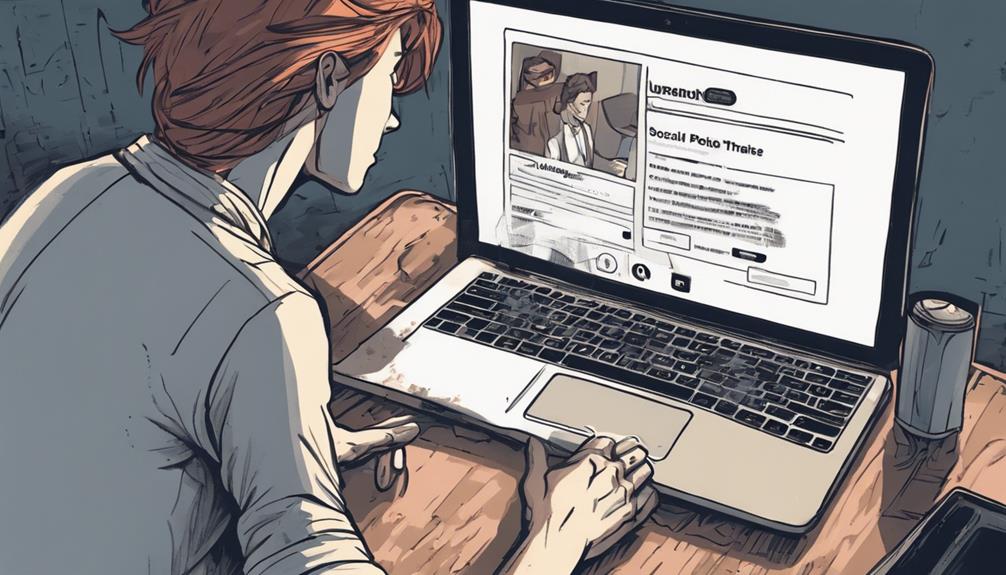Ah, the allure of narcissistic friendships, where self-absorption reigns supreme and manipulation lurks around every corner.
Let's unravel the intricacies of these toxic connections, shedding light on the subtle yet impactful signs that often go unnoticed.
It's a tale of self-discovery and empowerment, where we navigate the murky waters of emotional turmoil and emerge stronger.
Join us as we uncover the hidden truths behind these relationships and embark on a journey towards reclaiming our sense of self-worth and fostering healthy connections.
Key Takeaways
- Recognize signs of narcissistic behavior early.
- Protect mental health by setting boundaries.
- Develop coping strategies for emotional healing.
- Limit exposure to toxic friendships for self-preservation.
Recognizing Narcissistic Behavior in Friendships
In identifying narcissistic behavior within friendships, it's crucial to observe patterns of lack of empathy, manipulation, and a consistent need for admiration from the friend.
When a friend consistently disregards our feelings, manipulates situations to their advantage, and seeks excessive praise and attention, it may indicate narcissistic tendencies.
These behaviors can create a toxic dynamic where the friendship becomes one-sided, centered around fulfilling the narcissist's needs while neglecting our own.
It's essential to recognize these red flags early on to protect our emotional well-being and set boundaries.
Understanding the Impact on Mental Health

Understanding the profound impact of toxic narcissistic friendships on mental health requires a deep dive into the emotional turmoil and psychological strain endured by individuals entangled in such relationships. The constant lack of empathy, manipulation, and emotional exhaustion can lead to confusion, frustration, and a sense of being drained.
These friendships often leave individuals feeling embarrassed and stressed, trapped in a cycle of toxicity. The healing and forgiveness process can be arduous, affecting one's self-esteem and overall well-being. Recognizing the detrimental effects of these friendships is crucial in prioritizing mental health.
It's essential to acknowledge the toll these relationships take and seek support to navigate the challenging journey towards healing and moving forward.
Developing Coping Strategies and Moving Forward
Recognizing the profound toll toxic narcissistic friendships can take on mental health, developing coping strategies, and moving forward becomes imperative for reclaiming one's emotional well-being and self-worth. It's crucial to navigate this challenging journey with care and resilience.
Here are three key steps to help you on this path:
- Self-Reflection: Take time to understand your feelings and experiences, acknowledging the hurt caused by the toxic friendship.
- Setting Boundaries: Establish clear boundaries to protect yourself from further harm and create a safe space for healing.
- Seeking Support: Surround yourself with understanding and supportive individuals who can help you process your emotions and rebuild your sense of self-worth. Remember, healing is a gradual process, and it's okay to seek help along the way.
Unveiling Signs and Effects of Narcissistic Dynamics

Unveiling the dynamics of toxic narcissistic friendships reveals a pattern of manipulative behaviors and emotional detachment that significantly impact the well-being of those involved. In such relationships, one may notice needy and clingy behavior from the narcissist, where the friendship operates solely on their terms. Emotional connection is lacking, with rare communication initiated by the narcissist, who resorts to manipulative tactics to maintain the friend's engagement. This dynamic can lead to confusion, frustration, emotional exhaustion, feeling drained and embarrassed, as well as stressful and draining experiences. Recognizing these signs and effects is crucial in understanding the detrimental impact of narcissistic dynamics on mental health.
| Signs | Effects |
|---|---|
| Needy and clingy behavior | Confusion and frustration |
| Friendship is always on the narcissist's terms | Emotional exhaustion |
| Lack of emotional connection | Feeling drained and embarrassed |
| Rare communication initiated by the narcissist | Stressful and draining experiences |
| Manipulative tactics to keep the friend engaged | Healing and forgiveness process |
Setting Boundaries and Limiting Exposure
Transitioning from recognizing the signs and effects of narcissistic dynamics, it's crucial to establish clear boundaries and reduce exposure in toxic friendships for our mental well-being.
- Setting Clear Boundaries: Defining what's acceptable and unacceptable behavior helps protect our emotional health.
- Limiting Exposure: Minimizing contact with toxic friends can prevent further harm and stress.
- Protecting Your Peace: Prioritizing our mental well-being by distancing ourselves from negative influences fosters a healthier mindset.
Prioritizing Mental and Emotional Well-Being

Prioritizing mental and emotional well-being is essential for fostering a healthier and more balanced life. In the context of narcissistic friendships, it becomes even more crucial to safeguard our inner peace and emotional stability.
When dealing with friends who exhibit narcissistic traits, our mental and emotional health can suffer significantly. It's vital to recognize the impact these toxic relationships have on our well-being and take proactive steps to protect ourselves.
Setting boundaries, limiting exposure, and prioritizing self-care are paramount in this journey towards healing.
Overcoming Confusion and Emotional Exhaustion

Navigating through the complexities of toxic narcissistic friendships can leave us feeling overwhelmed by a mixture of confusion and emotional exhaustion. It's crucial to acknowledge these feelings and take steps towards healing. Here are three key strategies to help overcome these challenging emotions:
- Self-Reflection: Take time to reflect on your experiences and emotions. Understanding how the toxic dynamics have affected you can provide clarity and insight into your feelings.
- Seeking Support: Reach out to trusted friends, family members, or a therapist for support. Talking about your emotions with someone who cares can help alleviate the burden you may be carrying.
- Setting Boundaries: Establishing clear boundaries with the narcissistic friend can help protect your emotional well-being. Learning to prioritize your needs and boundaries is essential in overcoming confusion and emotional exhaustion.
Healing From Stressful and Draining Experiences

Healing from the impact of stressful and draining experiences in toxic narcissistic friendships requires intentional self-care and reflection. It's crucial to acknowledge the hurt and emotional exhaustion caused by these toxic relationships.
Engaging in activities that promote self-compassion and self-awareness can aid in the healing process. Seeking support from understanding friends or a therapist can provide validation and guidance.
Reflecting on past interactions can help identify red flags and establish healthier boundaries in future friendships. Embracing forgiveness, not for the narcissistic friend's benefit but for our own peace of mind, is a powerful step towards healing.
Breaking Free From Toxic Friendship Bonds

Breaking free from toxic friendship bonds requires setting firm boundaries and reclaiming our sense of self-worth. It's essential to prioritize our well-being and make choices that serve our mental health. Here are three crucial steps to break free from toxic friendship bonds:
- Self-Reflection: Take time to evaluate the dynamics of the friendship and how it affects your emotional state.
- Communication: Express your needs and boundaries clearly to the friend, emphasizing what's acceptable and what's not.
- Seeking Support: Surround yourself with positive influences and seek guidance from trusted individuals to navigate the process of disengaging from the toxic friendship.
Seeking Support and Sharing Experiences

Supporting one another through shared experiences can be a powerful tool in navigating challenging relationships with toxic friends. When we open up and share our stories, we not only validate our own experiences but also provide solace and understanding to others facing similar struggles. It can be a cathartic process, allowing us to release pent-up emotions and gain clarity on the dynamics at play. Here is a table to illustrate the emotional journey we undertake when seeking support and sharing experiences:
| Emotional Journey | Description |
|---|---|
| Validation | Feeling understood and heard |
| Empathy | Sharing in each other's pain |
| Healing | Finding strength in unity |
Frequently Asked Questions
How Can You Differentiate Between a Friend Who Is Self-Centered and a Friend Who Displays Narcissistic Behavior?
We can differentiate between a self-centered friend and one displaying narcissistic behavior by observing their consistency in empathy, manipulation, and need for admiration. Setting boundaries, limiting exposure, and prioritizing our well-being are crucial steps in navigating these relationships. Additionally, it’s important to recognize narcissist manipulation techniques such as gaslighting, guilt-tripping, or playing the victim to maintain control and avoid responsibility. Being aware of these tactics enables us to protect ourselves and make informed decisions about the relationship. Ultimately, prioritizing self-care and maintaining emotional distance can help foster a healthier dynamic or lead to the decision to distance oneself entirely.
Is It Possible for a Narcissistic Friend to Change Their Behavior and Become More Empathetic Over Time?
We believe that change is possible, but it requires genuine introspection and effort from the narcissistic friend. Empathy can be learned and practiced over time with self-awareness and willingness to grow. It's a journey of personal transformation.
What Are Some Red Flags to Look Out for in a Friendship That Indicate Narcissistic Tendencies?
In friendships, red flags indicating narcissistic tendencies include lack of empathy, manipulation, constant need for admiration, belittling, and difficulty in sustaining bonds. Protect yourselves by setting boundaries, limiting exposure, and prioritizing well-being.
How Can Someone Rebuild Their Self-Esteem and Self-Worth After Being in a Toxic Friendship With a Narcissist?
Rebuilding self-esteem and self-worth after a toxic friendship involves rediscovering our value and setting boundaries. We prioritize self-care, seek support from loved ones, and engage in activities that nurture our confidence. Together, we heal and grow stronger.
Are There Any Warning Signs That Someone May Be Susceptible to Falling Into a Toxic Friendship With a Narcissist in the Future?
We notice red flags early, like disregarding our feelings and constant need for attention. Setting boundaries, valuing ourselves, and prioritizing emotional well-being guard against toxic friendships. Recognizing warning signs helps prevent future entanglements in harmful relationships.
Conclusion
As we navigate the treacherous waters of narcissistic friendships, we must remember that healing is like a delicate dance, requiring grace and resilience.
By recognizing the signs, setting boundaries, and seeking support, we can break free from toxic bonds and embrace a future filled with self-love and happiness.
Let's tread carefully, like a gentle breeze guiding us towards the light, as we navigate the complexities of these toxic tales and emerge stronger and wiser.
Augustus is the visionary leader and Editor-in-Chief of Personality-Test.net. With an unwavering commitment to quality and authenticity, he oversees all content, ensuring it enlightens and empowers our audience. Augustus believes deeply in the transformative power of self-awareness and is dedicated to making Personality-Test.net a beacon for those on a journey to understand themselves better.










